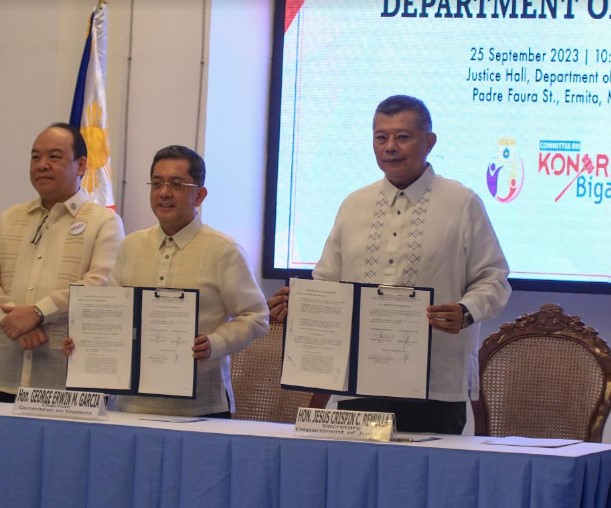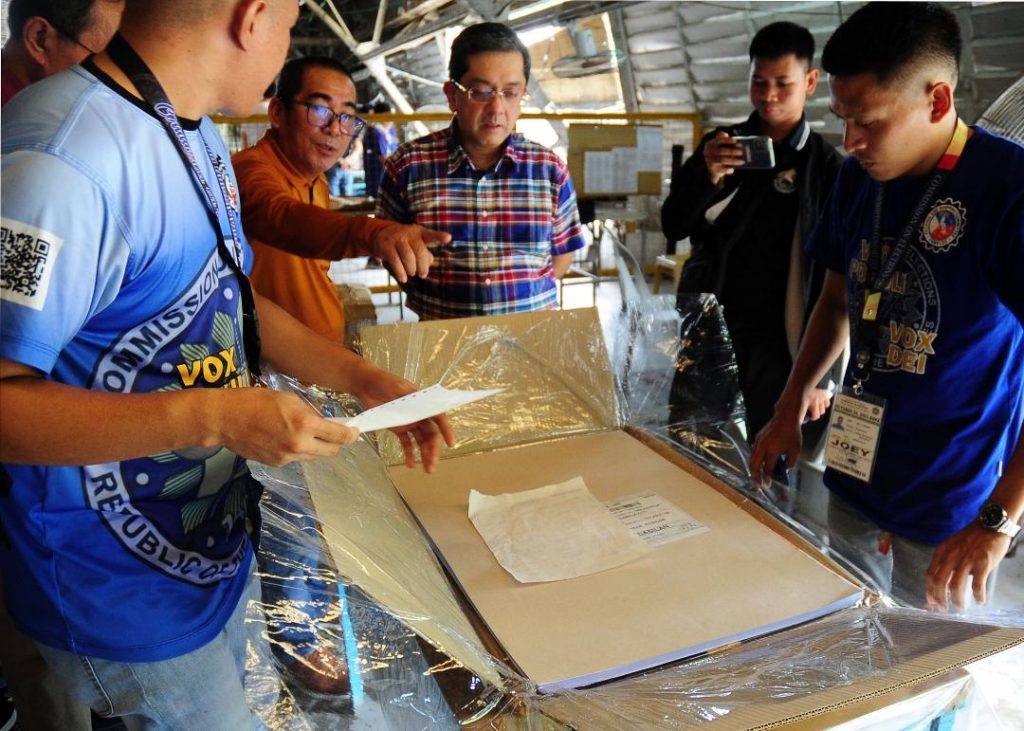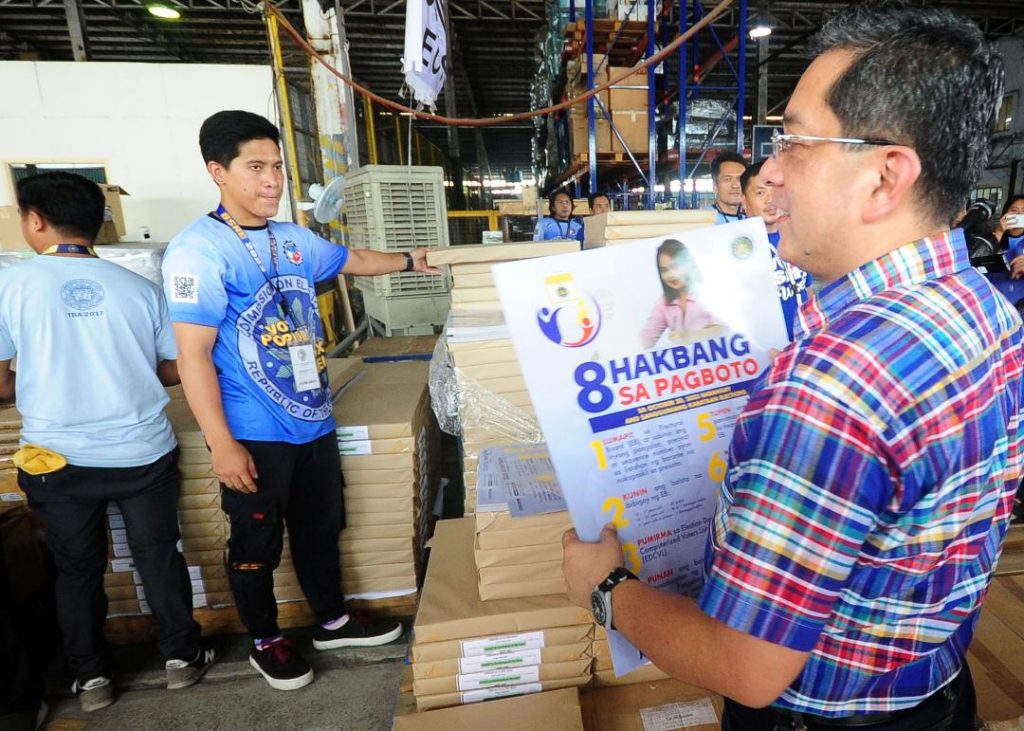Image Courtesy of Benjie Cuaresma
By Benjie Cuaresma
THE Commission on Elections (Comelec) and the Department of Justice (DOJ) have forged an agreement to vigorously pursue and prosecute individuals involved in vote-buying during the upcoming barangay and Sangguniang Kabataan Elections (BSKE).

JOINT FORCE. Commission on Elections Chairperson George Erwin Garcia (left) and Department of Justice Secretary Jesus Crispin Remulla show to the media the copy of their offices entered into, an agreement to go after vote-buyers in the Barangay and Sangguniang Kabataan Elections at the DOJ office in Manila on Monday (Sept. 25, 2023). Remulla said prosecutors nationwide will be on duty to accept complaints on Oct. 30, election day. (Photo by Benjie Cuaresma)
Justice Secretary Jesus Crispin Remulla announced that prosecutors nationwide will be on standby to receive complaints on election day, October 30.
“The fiscals will be readily available to handle potential cases,” he informed the media during the signing of the “Kontra Bigay” memorandum of agreement at the DOJ office in Manila. He emphasized the importance of having witnesses since many instances of vote-buying involve electronic wallets rather than physical cash transactions.
Remulla clarified that there is no conflict between this initiative and a recent DOJ directive to thoroughly review all charge sheets submitted to prosecutors to ensure that only complaints with a reasonable chance of conviction proceed to court. Complete and substantial sworn statements from witnesses could turn many cases into “open-and-shut” scenarios.
Comelec Chairperson George Erwin Garcia expressed confidence in the effectiveness of measures such as warrantless arrests for individuals engaged in vote-buying and red-flags such as the transportation of large sums of cash and giveaways as effective deterrents.
To date, Comelec has received 23 complaints related to vote-buying. The practice of “flying voters” (voters transported to different voting areas) has diminished significantly due to the adoption of modern voter identification systems, Garcia added.
The campaign period for the BSKE is set from October 19 to 28.
Following the closure of the candidacy filing period on September 4, Comelec reported a total of 1,414,487 aspirants, comprising 96,962 candidates for punong barangay (village captain), 731,682 for members of the Sangguniang Barangay (village council), 92,774 aspirants for Sangguniang Kabataan (youth council) chair, and 493,069 for Sangguniang Kabataan council positions. (ai/mnm)
Commission on Elections chairman George Erwin Garcia points to a stack of printed ballots for the barangay and Sangguniang Kabataan Elections as he leads the inspection at a warehouse in Sta. Rosa Laguna on Thursday. Garcia later declared the ballots were now ready for the October 30 BSK elections.


(By Benjamin Cuaresma/ai/mnm)
By: Patricia Lanzagarita
MANILA – With the barangay and Sangguniang Kabataan Elections (BSKE) 2023 campaign period drawing near, the Commission on Elections (Comelec) has reinforced its reminders to candidates regarding campaign regulations.
The campaign period for the BSKE is set to run from October 19 to 28, followed by a no-campaign rest day on October 29.
Meanwhile, the election day is on October 30, 2023.
Initially, the commission emphasized that it is illegal to remove, destroy, obliterate, deface, tamper with, or obstruct the distribution of lawful election propaganda.
Additionally, Comelec reiterated that various forms of prohibited election propaganda include printing or distributing pamphlets, posters, and other printed materials, unless they display the names and addresses of the printer and the payor.
Furthermore, it is against the law to erect billboards, tin-plate posters, balloons, or any other form of advertising in favor of or against a candidate or political party.
This prohibition also extends to advertising through cinematography, audio-visual units, and other screen projections, except for news telecasts.
“Any prohibited election propaganda gadgets or advertisements shall be stopped, confiscated, or removed by the representative of the Commission, with specific authority from the Commission,” stated the COMELEC in the Omnibus Election Code.
The commission emphasized that candidates, their relatives within the second civil degree of consanguinity or affinity, campaign managers, and party treasurers are prohibited from making any donations or contributions, whether in cash or in kind, during the campaign period and leading up to the election period.
“The act of giving, offering, or promising money or anything of value, or spending or offering to spend, whether directly or indirectly, to induce anyone to vote for or against a candidate, is a violation of the law and constitutes the Election Offense of Vote-Buying,” said the COMELEC.
Aspiring leaders are expected to serve the people with integrity and in accordance with the law. While COMELEC is responsible for enforcing these laws, it is the duty of candidates to uphold these principles it said.
In addition to adhering to the laws, the act of persuading voters holds significant importance, as a single vote can be a game-changer. (ai/mnm)
